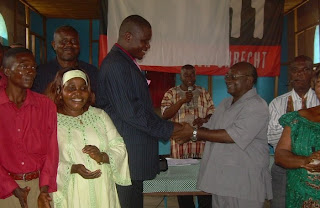
It's common for events to turn out much differently than we expect them to beforehand. It's even more common where communication is difficult and close collaboration is not particularly valued. So when the National Council of Development NGOs (CRONG) and 11.11.11 (the outreach arm of a coalition of Belgian NGOs interested in North-South issues, hunger and poverty) proposed a meeting we thought it would revolve around "developing the agricultural sector." Timothée reassured us that we would see the agenda when the meeting got started. ACDI was charged with encouraging as many representative groups in the agricultural sector to participate as possible. And Timothée moderated the gathering.
We never did see an agenda. It was only after a representative of the Ministry of Agriculture began a 2-hour presentation that participants began to understand the goal of the gathering. The government and CRONG were asking us to form a Council for Regional Agricultural Development. The council will bring together the different players: government officials, farmer's associations, universities and research centers, church project leaders, business people associated with the ag sector, extension projects, and investors. The goal is to provide a voluntary working group that can promote development in the agricultural sector, troubleshoot obstacles, encourage cooperative initiatives among farmers, facilitate the diffusion of information on better techniques and market conditions, arbitrate where land tenure ambiguities create conflicts of interest, search out creative ways to provide start-up capital for young people . . . -- the list goes on because a dynamic council could become an exciting crucible for change.

If the government is in earnest, a Council for Regional Agricultural Development represents a significant changing of the rules. First, the Ministry of Agriculture is telling Congolese citizens that they have a responsibility to shape the future development of the rural sector. Successful agricultural development will happen only when all the different players start working toward common objectives, systematically removing obstacles (like corruption and harassment) and creating favorable conditions for improving productivity (like information on better technologies, regular extension visits, improved ag education, responsive ag research programs etc.) Up until now the central government has gone it alone and citizens abandoned long ago any sense of control over or responsibility for the direction of "development." Now the door is being opened for local vision and initiative to drive regional development. That's a big change.

Second, the government is implicitly giving citizens permission to exercise an oversight role over local officials. The Ministry of Agriculture suggests that the Council keep an eye on local government taxation (formal and informal), encourage diffusion of information on legitimate practices, and hold government officials accountable for abuses. This is astounding and in fact may be too good to be true in practice. Still the escape hatch from the stifling environment of local corruption and intimidation appears to have opened a crack.

On day two of the meeting delegates chose a provisional slate of council members. One-third of the 35-40 people are drawn from the district administration. The remaining two-thirds come from district NGOs, church groups, farmer's associations, traders and partner reps like me. ACDI Lusekele, the farm resource center program for the Baptist Community of Congo, has 3 seats on the council: Timothée Kabila, Philomene Bidimbu, Philippe Kikobo, while Brother Kurt and I have been invited to be observers / advisors of the process.
Twenty years of experience in the Congo furnishes plenty of reasons to expect failure of noble initiatives. But I want to believe that this initiative has a chance to inject a little hope into the central Kwilu region. On offer is a future where the government becomes a facilitator for improving the livelihoods, well-being and opportunities of its citizens rather than one of the major obstacles to widespread economic development. Maybe it is devoted Christians who will tip the balance. After all, we claim to have a new ethic -- an allegiance to love, compassion, justice, righteousness, truth, peace. We even make the audacious claim that God's Spirit lives in us, giving us the power to choose goodness and consistently do good. God help us to shine with His light; may we be a refreshing rain that brings God's blessing to the just and the unjust alike.


No comments:
Post a Comment